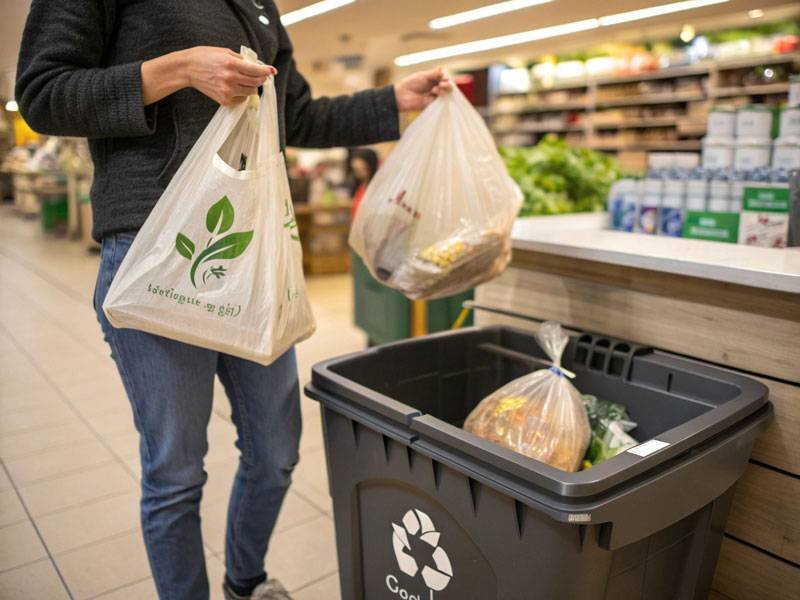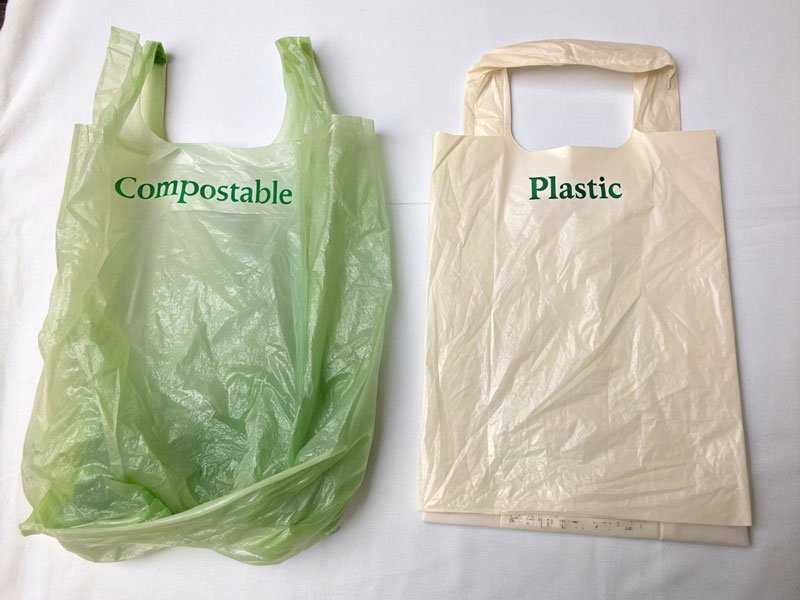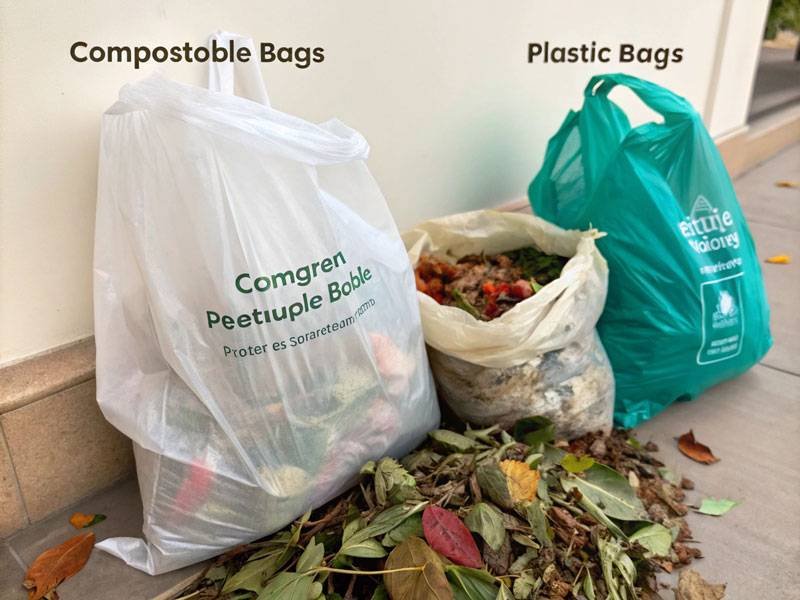As environmental issues become increasingly serious, plastic pollution has become a global concern. Every year, millions of tons of plastic waste enter the ocean and landfills, posing a threat to ecosystems and human health. Compostable bags are gradually gaining attention as an environmentally friendly alternative, but are they really better than plastic bags?
This article will delve into the definition, production process, recycling possibilities, disposal methods and how to choose between compostable bags and plastic bags to help readers make an informed decision. The goal is to reveal the advantages and disadvantages of the two through a clear comparison and promote sustainable consumption.
 environmentally friendly garbage bags
environmentally friendly garbage bags
What Are Compostable Bags
Compostable bags are packaging made of biodegradable materials, usually derived from plant-based raw materials such as corn starch, sugar cane or potato starch,PBAT, PLA, etc. These bags can be decomposed into water, carbon dioxide and organic matter under specific conditions (such as high temperature and microbial action in industrial composting facilities) without leaving harmful residues.
Key Features:
Must meet certification standards like BPI (USA) or EN 13432 (Europe), ensuring complete decomposition within 90-180 days.
Divided into industrial and home compostable bags, with the latter requiring less stringent conditions.
Free from traditional plastic components, preventing microplastic pollution.
Uses:
Used for food waste collection, food packaging, or lightweight shopping bags, common in supermarkets and catering.
What Are Plastic Bags
Traditional plastic bags are packaging made of petroleum-based polymers such as polyethylene (PE) or polypropylene (PP), which are widely used for shopping, garbage disposal and storage. They are cheap, strong and durable, but have a far-reaching impact on the environment.
Degradable plastic bags
Degradable plastic bags refer to plastics that can be gradually decomposed and eventually converted into water, carbon dioxide, methane or biomass after a period of time under specific environmental conditions through the action of microorganisms, light, oxygen or moisture. According to different degradation conditions,
Classification of degradable plastics:
Biodegradable plastic bags: can be completely degraded under natural conditions or composting conditions.
Compostable plastic bags: can be completely degraded under composting conditions.
Photodegradable plastic bags: decomposed into tiny fragments and dust by light, but difficult to completely degrade under natural conditions.
Thermo-oxidative degradable plastic bags: decomposed by heat and oxygen, but difficult to achieve true degradation under natural conditions
Key Features:
Non-biodegradable, potentially persisting in the environment for centuries.
Lightweight, waterproof, and tear-resistant, suitable for various purposes.
Low production costs, with massive global usage.
Uses:
From retail shopping bags to garbage bags, plastic bags are almost ubiquitous, especially in developing countries.
 compostable vs plastic bags
compostable vs plastic bags
Compostable Vs Plastic Bags: How Are They Made
Plastic Bag Production:
The production of plastic bags relies on polymers derived from oil or natural gas. The process includes:
Crude oil is cracked to produce ethylene or propylene.
Polymerization forms polyethylene or polypropylene pellets.
Pellets are melted, blown into films, and cut into bags.
Environmental Impact:
High energy consumption, emitting significant greenhouse gases.
Relies on non-renewable resources, exacerbating depletion.
Compostable Bag Production:
Compostable bags use renewable plant-based materials, with production steps including:
Extracting starch or cellulose from corn, sugarcane, etc.
Fermentation or chemical processing forms biopolymers like polylactic acid (PLA).
Polymers are processed into films and shaped into bags.
Environmental Impact:
Lower energy consumption and carbon footprint.
Uses renewable resources, but farming may compete for land and water.
Summary:
Plastic bag production relies on non-renewable resources with high environmental costs; compostable bags use renewable materials but may have indirect impacts from agriculture.
Are Plastic Bags Recyclable
Recycling Challenges:
Many plastic bags (e.g., thin shopping bags) are lightweight and clog recycling machinery.
Contamination: Food residues or mixed materials reduce recyclability.
Regional disparities: Not all areas have facilities for plastic bag recycling.
Global Data:
Estimates suggest only 5%-10% of plastic bags globally are recycled, with most ending up in landfills or incinerators.
Alternatives:
Prioritize reusable bags to reduce demand for single-use plastic bags.
Where available, participate in supermarket or community plastic bag recycling programs.
 how to deal with compostable bags vs plastic bags
how to deal with compostable bags vs plastic bags
How to Deal with Compostable Bags Vs Plastic Bags
Handling Compostable Bags:
Proper Composting:
Industrial compostable bags require professional facilities (around 60°C, aerobic conditions).
Home compostable bags can break down in backyard compost heaps, ensuring moisture and aeration.
Risks of Mishandling:
If discarded in regular trash, they may not decompose, behaving like plastic bags.
Should not be mixed with plastic recycling, as they contaminate the stream.
Handling Plastic Bags:
Reduce Usage:
Use reusable bags whenever possible to avoid unnecessary single-use plastic bags.
Recycle:
Drop clean plastic bags at designated recycling points, like supermarket bins.
Reuse:
Reuse plastic bags (e.g., as trash liners or storage) before disposal.
Compostable Bags Vs Plastic Bags
| Dimension | Compostable Bags | Plastic Bags |
|---|---|---|
| Environmental Impact | Biodegradable, reduces long-term pollution; requires proper composting | Non-biodegradable, creates microplastics, causes persistent pollution |
| Production Resources | Renewable plant materials, lower carbon footprint | Non-renewable oil, high carbon emissions |
| Cost | Higher upfront cost (~$0.1-0.5 per bag) | Low cost (~$0.01-0.05 per bag) |
| Durability | Lower strength, less suitable for heavy items or long-term storage | Strong and durable, versatile for many uses |
| Disposal Difficulty | Requires dedicated composting facilities, complex disposal | Recyclable but low recycling rates, often landfilled |
Compostable Bags Vs Plastic: How to Choose
When to Choose Compostable Bags:
- Access to Composting: Ideal for food waste or lightweight packaging if industrial or home composting systems are available.
- Short-Term Use: Suitable for single-use needs like grocery shopping or takeout packaging.
- Eco-Priority: Best for reducing microplastics and long-term pollution.
When to Choose Plastic Bags:
- Heavy-Duty Needs: Better for heavy loads or high-durability tasks, such as moving or construction waste.
- No Composting Access: In areas without composting facilities, recycling or reusing plastic bags may be more practical.
- Budget Constraints: Cheaper option for cost-sensitive scenarios.
Best Practices:
– Reduce: Prioritize reusable bags (e.g., cloth or canvas) to minimize waste.
– Know Local Policies: Understand local waste management rules for proper disposal.
– Support Innovation: Choose certified compostable bags to encourage eco-friendly advancements.
Conclusion
Both compostable and plastic bags have their pros and cons, and the choice depends on the situation and the way it is handled. Compostable bags excel in reducing long-term pollution and microplastics, but require proper composting infrastructure. Plastic bags are cheap and durable, but they are very harmful to the environment.
The most sustainable path is to completely reduce the use of single-use plastic bags and switch to reusable alternatives. We encourage readers to evaluate their needs, use local resources, and support initiatives such as plastic bans or composting projects.
